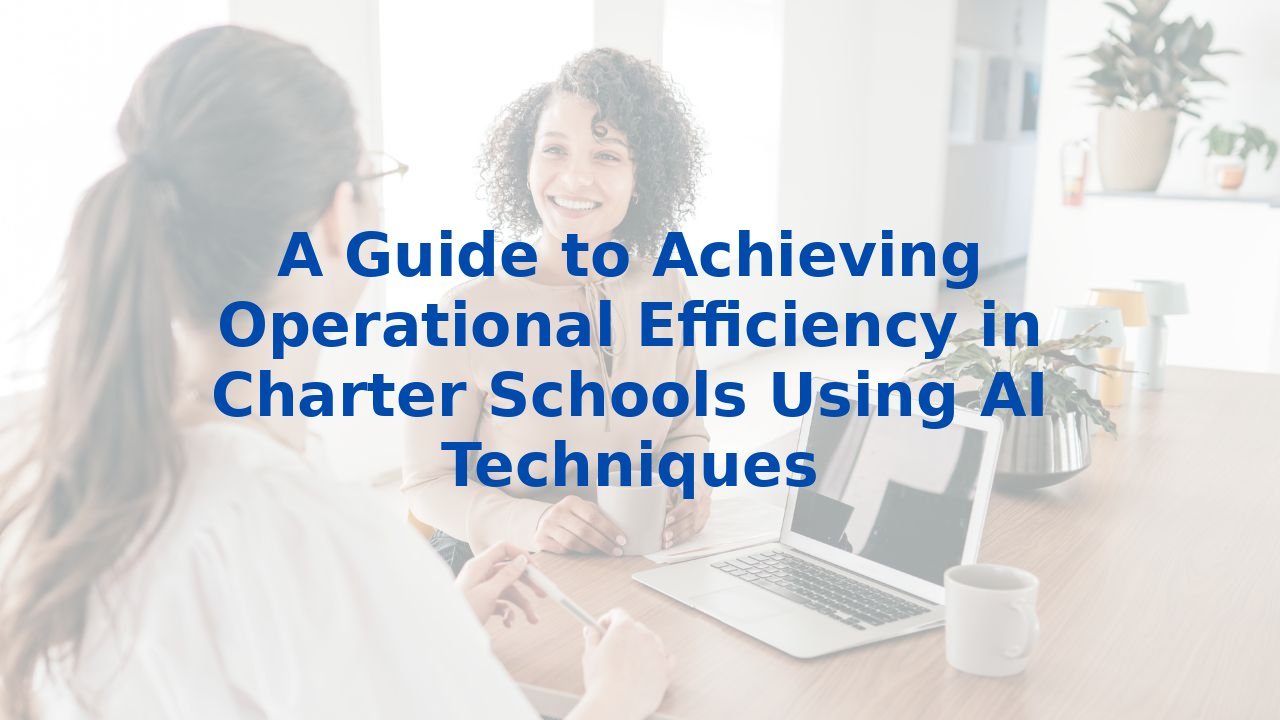A Guide to Achieving Operational Efficiency in Charter Schools Using AI Techniques

A Guide to Achieving Operational Efficiency in Charter Schools Using AI Techniques
In the realm of education, charter schools are continuously seeking innovative methods to improve their operational efficiency. With the integration of artificial intelligence (AI), these institutions can streamline processes, enhance decision-making, and boost overall productivity. By leveraging AI techniques, charter schools can unlock new potential and transform their operational strategies.
Automating Repetitive Tasks
One of the standout advantages of AI lies in its capability to automate mundane and repetitive tasks. For charter schools, this means tasks such as data entry, attendance tracking, and report generation can become automated processes. By employing AI-powered systems, schools can minimize human error and accelerate workflows, allowing educators to dedicate their time to meaningful interactions with students rather than getting bogged down in administrative tasks. The ripple effect? Enhanced focus on teaching and innovation within the classroom.
Enhancing Decision-Making
Decision-making in educational environments is critical—AI can be a game changer in this domain. By processing vast amounts of data and providing insights in real-time, AI tools help administrators make informed, data-driven choices. Consider the ability to analyze student performance data and identify patterns. With AI’s analytical prowess, charter schools can tailor educational approaches to meet the needs of their students while swiftly adjusting to emerging trends in education.
Optimizing Workflows
Streamlining workflows is essential for maximizing productivity and ensuring resource allocation aligns with strategic goals. AI can assist charter schools in identifying bottlenecks and redundancies within their operational processes. By restructuring these workflows, educational institutions can improve their operational frameworks, leading to faster completion of essential tasks. A more organized environment translates into a better educational experience for both staff and students.
Improving Quality Control
Quality control in charter schools not only pertains to educational outcomes but also the administrative processes that underpin them. AI-driven quality control measures can be implemented to monitor various aspects of operations, ensuring that standards are maintained consistently. By recognizing potential issues early, schools can avoid costly errors and facilitate smoother operations—this directly impacts both the learning environment and overall administrative efficiency.
Narrowing Skill Gaps
An additional benefit of AI in the educational space is its potential to bridge skill gaps among educators and staff. AI tools can assist individuals—regardless of skill level—in tasks ranging from lesson planning to classroom management. As a result, even the least experienced staff can contribute more effectively, fostering team cohesion and promoting a collaborative school culture.
Faster Learning for New Employees
Bridging the learning gap for new hires is critical for charter schools aiming for operational excellence. AI-powered tools can provide real-time guidance and support, helping newcomers acclimate to their roles swiftly and effectively. In roles that rely heavily on interpersonal skills, like teaching and student support, having AI as an ally can elevate efficiency and ensure that staff members are equipped to manage inquiries and challenges from day one.
Addressing Ethical Considerations
While incorporating AI into charter schools holds immense promise, ethical considerations should be at the forefront. Transparency regarding how AI is utilized within the school environment is paramount. Engaging staff in discussions on AI’s implications fosters trust and ensures that everyone understands its role in improving school operations. Ethical implementation establishes a responsible framework that promotes collaboration and reduces fears surrounding technological advancements.
Training Employees for AI Integration
To fully harness the power of AI, charter schools must prioritize training for their staff. Understanding AI's capabilities and limitations, as well as learning to work alongside these tools, empowers educators and administrators alike. Conducting ongoing training sessions will equip staff with the necessary skills to integrate AI into their daily workflows. For organizations aiming to empower their entire workforce with AI skills, comprehensive training solutions are available that cater to various roles within the school structure.
Conclusion
In summary, AI offers an invaluable opportunity for charter schools to refine their operational efficiency. By automating routine tasks, enhancing decision-making capabilities, and optimizing workflows, educational institutions can create a more productive environment for both staff and students. Addressing ethical considerations and investing in training will further ensure the responsible and effective integration of AI, driving innovation and improving educational outcomes. The future is bright—it's time to embrace the potential of AI in education.